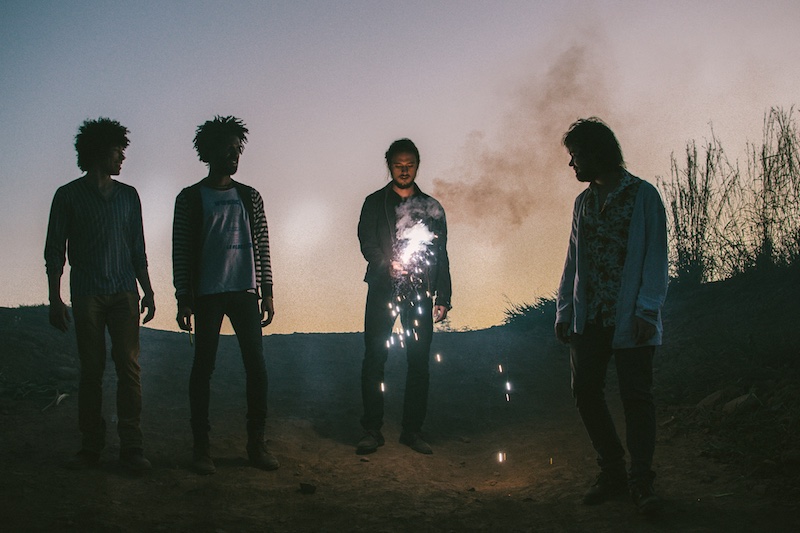Boogarins é Foda
Brazilian psych-pop foursome takes up residency at Hotel Vegas
By Michael Toland, 10:00AM, Thu. Jun. 30, 2016
Boogarins’ pop smarts, psychedelic atmospherics, and South American rhythms won over locals at both South by Southwest and Austin Psych Fest. Recording locally now permits the Brazilian quartet a four-weekend stand at Hotel Vegas, the first club they played outside their country. They answered questions via e-mail driving from Portland to Anchorage.
Austin Chronicle: Why a residency in the middle of your tour instead of simply more traveling?
Benke Ferraz: We’ve been doing a lot of traveling lately, plus we never had this residency experience before. It seems a great way of connecting with places. Our concerts are full of improvised parts and to play more than once in such a short space of time will let us be more free in some ways.
AC: Why Austin?
BF: Austin was the first place we stepped out of Brazil, two years ago in 2014, coming to SXSW. In that opportunity we played twice in Hotel Vegas. We have great supporters of the band there since that first moment. We are living around [Austin’s] Space Rehearsal & Recording Studio and are working on our third album while doing this residency in July.
AC: A large part of your most recent album, Manual, was recorded in a proper studio outside of your home country Brazil. You also did it while on tour. Were you always planning to record that way, or was it a spontaneous decision based on circumstances?
Dino Almeida: It was totally spontaneous thing. We were in the middle of our tour playing at Primavera Sound in Barcelona, and after that we will have a one-month break. Together with this came the invitation for us to record the album in Gijón, also in Spain, at the Circo Perrotti, a total analog studio, with Jorge Explosion. That was nice, and we felt we have to catch that opportunity to register that moment of the band with the same free flow movement that we are having with the tour.
AC: How did it feel recording in a studio, on the clock, instead of at home on your own time? Did that make it easier or harder?
DA: I think it was just different. As I said, Manual captures that moment of the band and is almost a total live album after more than 60 concerts. So, when we were recording, we felt in a rush for sure, and a little bit got lost in all that analog stuff that we never handled before. After one year of listening to the album before it was released, we felt good with the picture we get – that rushed feeling in the recording process, but also the understanding that this is how good things maybe could happen.
AC: Brazil has a long and rich tradition of psychedelic music, particularly with the Tropicalismo movement of 40-plus years ago. How popular is psychedelic music in your home country? Do you feel like Boogarins is part of that tradition?
DA: It's great that a lot of young people are very into some crazy and experimental music made in Brazil in the late Sixties and Seventies. For me, this sounds more like people are into a tradition of good music and good experiments with music than a real psychedelic tradition. It’s not a mainstream thing, but we have a good scene all over the country into this new Brazilian music of a variety of styles.
We can call this psychedelic, but for me it sounds more that we are in this group of Brazilian artists who expands and mixes our traditional way of doing music with nowadays textures more close from what we live now. It doesn’t matter what language you speak, as we are projecting feelings in music in the same space of the time. For me, this is what Os Mutantes, Caetano Veloso, Gilberto Gil, Novos Baianos, and a bunch of other not-so-well-known Brazilian artists did and are doing all the time.
If we can call this traditional, it sounds more open and ownerless than any Tropicalia or psychedelic tradition.
AC: How is the reception for your music in other countries as opposed to Brazil?
Raphael Vaz: It’s been great! Even when people have no idea what the hell the lyrics are all about, they can feel it happening through the music. I think this situation gives us more freedom to experiment on the shows, making us think more about the whole music experience than the songs itself. That said, there’s this tiny difference on ways of attention, with advantages on both sides.
AC: Brazil is a country sharply divided by income inequality, a situation that’s one of the themes on Manual. Do you see warning signs of the same divide in other countries you’ve visited?
DA/RV: Not at the same way we see in Brazil right now, especially with this economic-political crisis that we’ve been passing through. It’s difficult to compare, because you can’t understand the complications of a whole country just spending some days there, right? And when you don’t even speak the native language it’s more difficult, for sure. But sometimes, walking on the streets or talking to someone, you have that old feeling about how a bunch of people have to suffer to keep the things “working well.”
The whole world is kinda buried into this inequality and social divisions problems. For sure each country has specifics cases, but all of them are connected, like if these problems are solid structures from the nowadays globalization scenario. All this is kinda connected with the same individual bad feelings. Every time we go through this subject in a conversation with someone, we end talking about greed, intolerance, and those shit feelings that made good things be stuck and bad things flow easy.
Because of this, I can say that Manual is more about these internal and individual thoughts or feelings, as this is the first place we go in conversation or thinking about these general humanity problems. And as humanity problems, we always start this talk getting the big nation signs and in a few minutes is all about this essential feeling of who generates the big problems.
AC: In the Brazil of the late Sixties, artists could be arrested for music with sociopolitical meaning and criticism. How is music like that received in Brazil today?
DA: We had a military dictatorship back in that time, who arrested, tortured, and made a strong censorship over news, art, and whatever else critic stuff they could block. You may have to go a little bit deeper to get the whole panel of those years. Nowadays with the internet being the most used way by Brazilian artists to release this social/political meaning songs, these songs reach a lot of people who are into the new Brazilian music, and they share as they can on the internet.
But these songs don’t go too far and kinda stay in our new independent Brazilian music bubble. I hope that this new music, at some point, reaches other spaces inside the big, unequal, and diverse Brazilian society. We have a bunch of new artists (and some constantly break the bubble that I was talking before) who distill strong words and feelings about Brazilian contemporary problems. Not just political, or very political, but not in the straight thinking of this word.
Like Negro Leo, our hometown friends Carne Doce, Supercordas in some songs of their last album Terceira Terra, and Ava Rocha, Criolo, Emicida. Check out songs and you get a little bit of what kind of critique our new artists are weaving.
AC: What are you most looking forward to when you come back to Austin?
Ynaiã Benthroldo: Enjoying the public pool, having some fun with our new friends, and building a very good relationship with this awesome city. Austin é foda.
A note to readers: Bold and uncensored, The Austin Chronicle has been Austin’s independent news source for over 40 years, expressing the community’s political and environmental concerns and supporting its active cultural scene. Now more than ever, we need your support to continue supplying Austin with independent, free press. If real news is important to you, please consider making a donation of $5, $10 or whatever you can afford, to help keep our journalism on stands.
Carys Anderson, June 28, 2024
Richard Whittaker, May 8, 2024
July 5, 2024
June 28, 2024
Boogarins, Tropicalismo, Os Mutantes, Caetano Veloso, Gilberto Gil, Novos Baianos, Negro Leo, Carne Doce, Supercordas, Ava Rocha, Criolo, Emicida, the Ripe, SXSW, Space Rehearsal & Recording










